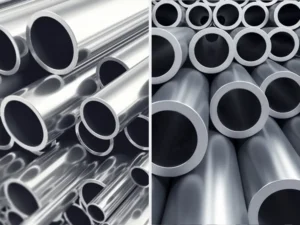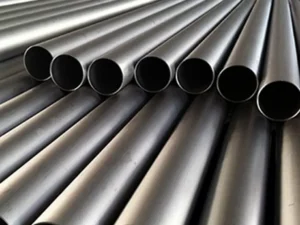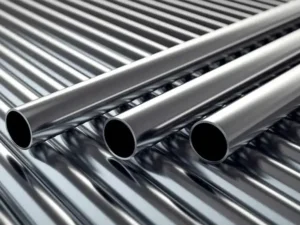Most of us deal with different types of metals. All those metals have distinct features. Titanium and stainless steel are very popular. Their extensive usability gives rise to the comparison of titanium vs stainless steel. Some argue that titanium is ideal, and others advocate for stainless steel.
These two metals have many differences, which sets them apart. Making decisions without understanding those differences is like calling failure. Are you confused about these two metals? Worry not! This article will help you understand these two metals. In the end, you’ll be able to make wise decisions. So, let’s get started!
Overview of Titanium and Stainless Steel

Both metals stand out in their performance from the industrial to the domestic level. However, a distinct contrast lies in their durability, melting points, and conductivities. Titanium is more corrosion-resistant and durable. On the flip side, stainless steel, an alloy, is considered versatile and affordable.
Titanium is a pure metal and can be used with different alloy elements as well. Lightweight, and exceptional strength are two salient features of this metal. You might think being lightweight makes it weak, but that is untrue. Titanium has a high strength-to-weight ratio, so it can withstand much stress without breaking.
Another standout property of titanium is its biocompatibility. It indicates that titanium is harmless to our tissues. For example, artificial bones made of titanium do not cause any issues in the human body. This incredible property of titanium makes it popular in the medical field.
Stainless steel also has many top notch properties, making it a go-to option for manufacturers. It is an alloy of solid metals such as iron and chromium. It contains around 10% of chromium which makes it rustproof. Due to this, car bodies are made with stainless steel to avoid corrosion.
However, these alloy metals also increase the weight of stainless steel. This can be a big issue as it limits its use in the aerospace and medical industries. Still, it is used in other fields where weight doesn’t matter, such as the utensils industries. One thing I like most about stainless steel is its cost-effectiveness and versatility.
Critical Differences Between Titanium and Stainless Steel

Have you grasped the basics of titanium and stainless steel from the overview? I’m sure you’ve got it! Let’s explore more details about those two metals. In the section below, I’ll compare these metal heads to heads. This will help you better understand and make a wise decision while choosing them.
1- Strength and Weight
Both metals have good durability and strength. However, titanium and stainless steel are different in terms of their composition. The atoms in the titanium are closed-packed or connected together. This arrangement of atoms is a prominent factor that makes them very strong. Breaking or disturbing this arrangement of atoms requires very high energy.
Moreover, its low density makes it lightweight, which is a need in today’s era. So, its usage helps in making strong but very lightweight products. On the flip side, stainless steel is also decent in terms of strength. But this strength comes with its higher weight. Its usage will make a product heavyweight.
If we compare the strength of these, I favor the titanium material. You can even use titanium with another alloy element to achieve your desired level. Properties. Remember, titanium is not brittle, but stainless steel is brittle to some extent, which is another drawback. The high weight of stainless steel makes it hard to handle and use.
2- Melting Point
The melting point is a range of temperatures that turn solid into liquid form. The rigid and more robust material will have a higher melting point and vice versa. Titanium has a melting point of 1,668°C, which is very high. This melting point makes titanium the part of engines in airplanes and shafts. It remains stable at high temperatures when used in airplane engines.
Stainless steel’s melting point is slightly low compared to titanium. It ranges from 1,400°C to 1,530°C. Are you confused about why this material has a range of melting points instead of one fixed number? Let me explain the reason. Stainless steel is a mixture of various metals with different melting points.
So, some of those alloy elements melt at low temperatures. On the flip side, other elements melt at very high temperatures. Moreover, the presence of different impurities also influences the temperature. That’s why stainless steel has a range. Remember, stainless steel is thermally sensitive comparatively and deforms under high temperatures.
3- Corrosion Resistance & Durability
Corrosion is a primary concern when dealing with any metal. Between these two metals, titanium is ahead in terms of corrosion resistance. But the question arises: What is the reason behind it? It is due to the formation of an oxide layer. When titanium is exposed to harsh environments, it forms a protective layer of titanium oxide.
This layer lasts for years and protects the actual surface. Moreover, the oxide layer also withstands salty water. Therefore, titanium is fundamental to the ship’s central bodies and skimmers. On the flip side, stainless steel is also corrosion-resistant. Why? Because it contains chromium, which makes a chromium oxide layer.
However, I favor titanium material when it comes to corrosion resistance. It offers better results when used in harsh conditions. However, stainless steel is corrosion-resistant. But its performance goes down when used in harsh conditions. Additionally, better corrosion resistance and strength make titanium more durable.
4- Electrical Conductivity
Electrical conductivity is another factor that sets them apart. Both titanium and stainless steel are not very good conductors of electricity. However, if we judge narrowly, stainless steel is slightly better in terms of conductivity. Stainless steel wires are used where more strength and low current are required.
However, titanium is a completely non-conductor of electricity. Why? Because of its tightly packed atoms, titanium has no free electrons. This means that no movement of electrons could carry current. Moreover, it can withstand short circuits and is used for robust insulation in electrical appliances. If you want electrical conductivity, stainless steel would be a better choice.
5- Thermal Conductivity
Thermal conductivity is a property of metals that indicates the ability of a metal to transfer heat. This transfer is possible due to the movement of electrons. You can consider it the same as electrical conductivity. Stainless steel is a conductor of heat. But this ability also weakens it by making it thermally unstable.
Due to this, its chances of melting become high, which is a disadvantage. Titanium, on the other hand, has low thermal conductivity. Again, the reason is the tight packing of atoms. However, this property makes titanium super thermally stable, a requirement for many projects. For example, automobile engines produce extensive heat. Ordinary metals cannot bear such extreme heat, so titanium is used to perform this task.
6- Cost and Affordability
Cost matters a lot when investing in a metal project or business, isn’t it? However, there is a difference between the cost of both metals. Titanium’s high price might shock your wallet. The main reasons are its availability and mining procedure. It is present deep in the earth, which increases extraction costs.
On the flip side, stainless steel is suitable for budget-conscious people. Its pricing is very low as compared to the titanium. As mentioned above, it is an alloy of cheap metals such as iron and chromium, all readily available. This cost-effectiveness makes it popular when making everyday products.
Titanium or Stainless Steel: Which is Best for You?

Both of these metals are excellent in their own way. However, the ultimate choice depends on the nature of your business or project. If you want lightweight and strength simultaneously, titanium is your go-to option. If you wish for cost-effectiveness and versatility, stainless steel will suit you better.
Before making any decision, getting the complete picture of both metals is essential. You might decide to choose stainless steel due to its low price. That’s one side of the image. It may save you some bucks, but its durability will deceive you. Its high weight will make its handling hard.
Meanwhile, titanium has the upper hand regarding durability and strength. You can use products made of titanium in every type of severe environment. Its oxide layer-forming ability helps combat rust even in a salty environment. However, these excellent properties come with a trade-off, as titanium’s price is very high.
So, their final selection comes down to your needs, budget, and preferences. Are you the kind of person who prefers quality? Titanium is the way to go. It will give you peace of mind and promise a long life span. Moreover, you should also evaluate the nature of your project. If you want to keep the cost of your project low, stainless steel will be a sensible option.
Frequently Asked Questions
Can titanium rust?
Titanium is corrosion-resistant due to its oxide layer-forming ability. It makes titanium oxide a thin layer when in contact with oxygen. This layer ensures corrosion resistance. So, there are scarce chances of rusting. The product made of titanium will last for years.
Is titanium cooler than stainless steel?
The thermal conductivity of titanium is less than that of stainless steel. It cannot transfer heat more quickly than stainless steel due to the tight packing of atoms. So, yes, you can say titanium is cooler than stainless steel.
Which is more common, titanium or stainless steel material?
The usability of stainless steel is standard across many industries. The reason is that it is less costly. Manufacturers can afford to use them in different projects. However, titanium is expensive and only used at a professional level. So, stainless steel is more prevalent.
Conclusion
In short, titanium is best known for its strength and long-lasting ability. Its corrosion resistance, power, and lightweight make it shine in almost all industries. But titanium’s high price adds salt to the wounds. On the other hand, stainless steel is a versatile and inexpensive option.
It is also durable and robust, but its weight dims its popularity. However, it has the benefits of low cost and easy availability. But there is one answer for all when it comes to the choice between titanium and stainless steel. Each has unique features and limitations. So, analyze the needs of your project.
